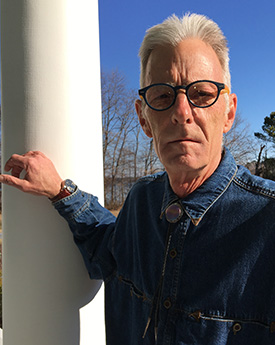Patient Stories - Michael Sudmeier

When a hoarse voice and nagging cough led him to seek medical attention, St. Michaels resident Michael Sudmeier learned he had precancerous growths on his vocal cords. Elizabeth Guardiani, MD, assistant professor of otorhinolaryngology (head and neck surgery) at University of Maryland Medical Center, performed laser removal to prevent the growths from progressing to cancer. The procedure was a success. For a while, all was well.
"I was told to stop the cigarette habit, which I failed to do," Sudmeier said. "As a result, the neoplasms [growths] returned." Three more laser treatments rid his throat of the growths. Then the COVID-19 pandemic arrived. Sudmeier missed a follow-up appointment. A year and a half later, the hoarse voice returned, signaling that he had more growths. This time, they were cancerous.
Dr. Guardiani referred Sudmeier to the Maryland Proton Treatment Center in Baltimore. During the consultation, Sudmeier's radiation oncologist determined that proton therapy was not the best treatment option for him due to the location of his cancer. His care team referred him for advanced photon radiation therapy available at the Cancer Center at UM SRH. Sudmeier was thrilled to learn he could receive the best care for his larynx cancer close to home.
For almost six weeks, Sudmeier underwent radiation therapy five days a week. He met weekly with radiation oncologist, Emily Shea Kowalski, MD, assistant professor at the University of Maryland School of Medicine and medical director at the Cancer Center's Requard Radiation Oncology Center. Dr. Kowalski works closely with John Mastandrea, MD, a 35-year veteran of the Cancer Program who now serves as chief of radiation oncology at UM SRH. During her sessions with Sudmeier, Dr. Kowalski reviewed his progress and addressed any side effects. Every week he got the same welcome report—the treatment was going according to plan.
"The technologies that deliver radiation treatments are some of the most complex in the medical world," said Shifeng Chen, PhD, professor of radiation oncology at the UM School of Medicine and associate chief of clinical physics in the Division of Medical Physics. "At the Cancer Center at UM Shore Regional Health, skilled professionals, including physicists, dosimetrists, radiation therapists and nurses, collaborate with the radiation oncologists to plan and deliver safe, targeted and highly effective radiation treatment plans."
Now part of the larger UM School of Medicine's Department of Radiation Oncology network, the Cancer Center at UM SRH benefits from the expertise offered through the larger academic medical system and access to the latest treatment technologies and techniques. Since 2020, the department's team of nationally recognized experts has brought two new state-of-the-art radiation delivery devices, called linear accelerators, to the Cancer Center.
Dr. Kowalski considers advances in technologies for treatment delivery one of the most exciting developments in radiation oncology. "As technology improves, patients have better results and fewer side effects along the way," she said.
Following successful radiation therapy, Sudmeier got his life back and started enjoying spending time with others once again. "While I'm not going to be offered an audition by the Vienna Boys' Choir, my voice has returned, and I can carry on a normal conversation," Sudmeier said. "Before this treatment, I could not speak or be understood. What was once impossible is now possible, thanks to my care team at the Cancer Center."
